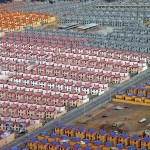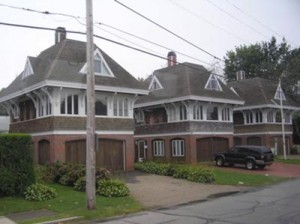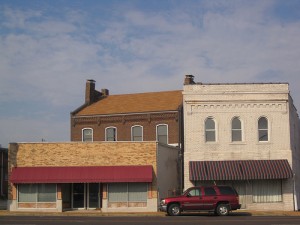 I know when it’s time to give up the game: when you start dreaming about it.
I know when it’s time to give up the game: when you start dreaming about it.
Last night I dreamed that I was telling a group of people the difference between commercial and residential real-estate … the one – key – difference.
Don’t worry, because I’m going to continue blogging about personal finance, but I guess I should at least bring my dream into the the real world by writing about these two classes of real-estate here:
So, what is the difference between the two? That one, key difference?
Is it price? Is it purpose (you can live in one, work in the other)? Something else?
I think it’s all of those things, and more, but I think one reason stands out:
This is residential real-estate, these two houses [pictured above] are the same in every respect:
They look the same; they cost about the same; they will provide a similar standard of living … and, they will produce roughly the same investment return over time.
This is commercial real-estate, these two properties [pictured above] are the same in one very important respect, yet:
They don’t look the same; they didn’t even cost the same; they are totally different types of properties (one is an office, the other a small showroom and warehouse) …
… but, here’s the one thing that makes them identical, at least to an investor:
They will produce roughly the same investment return over time.
You see, residential real-estate is bought/sold/valued on the basis of its utility as a home, not an investment. So, while you can choose to live in it or rent it out as an investment … ultimately, it’s all about its desirability as a future home, street, neighborhood.
Residential real-estate is roughly valued by comparison to others like it, and is ultimately favored by investors for its future value …
… even though residential real-estate is considered a ‘safe, easy’ investment, it’s a sham ; a false promise based on comfort: we all know and understand (to a greater/lesser extent) the value of residential real-estate, because we live in it. Or, if not in ‘it’ in something very much like it, probably even in a neighborhood very much like it.
But, this is false and residential real-estate is actually the most dangerous form of real-estate investment because is is largely speculation; most of the return from residential real-estate is based on capital appreciation.
[AJC: there are exceptions, of course: defence housing, rural areas, and so on … generally, though, you are trading future appreciation for lower rents now. Cashflow positive real-estate does exist, it’s just than most people don’t know how and where to find it]
Commercial real-estate has the reputation of being difficult. Of course, it’s not: you purchase a property, you find a property manager, you rent it out, you collect the rents … nothing could be easier.
And, you are rewarded in the short-term: commercial real-estate is mostly about the income that you can derive from the property. It’s current and future value are simply a multiple of that return [the capitalization rate].
The returns are usually higher, per dollar invested, than residential real-estate (although, the banks will lend less against it); capital appreciation more certain; and, it’s easier to manage (tenants generally don’t trash the place; they pay most of the outgoings; they shoulder the lion’s share of the maintenance burden on the property).
Since most people are too scared to invest in commercial (so, they fight each other – in most ‘normal’ markets – to invest in residential real-estate) overall returns, in my experience, are generally much better.
What do you think they key difference is?







I’ve been wanting to get into commercial real estate for some time, but there have been two barriers for me so far:
1) Given the high rates charged on commercial mortages and low rents (at least in my area) it seems nearly impossible to find a property that would be cash-positive without putting an absurd amount down.
2) The few friends I know who own commercial property, even in busy areas, are losing a good amount of money due to vacancies. The economy has killed a good chunk of businesses, so demand for space to lease is low right now and it’s driving rent down.
Every time I look into it the numbers just never work out. I have done only cursory research, though, so it’s possible I’m missing something big.
@ Tyler – You may need to look beyond your area. Commercial real-estate is subject to the same ‘market timing’ fluctuations that other types of investment suffer.
Interesting, I get 15% down and 5% APR with my banks. Seems reasonable enough to me. Consider cross collateralizing the property. If you have significant equity, banks will allow you to pledge equity in one asset against another. Your cash flow will be reduced but it’s a start. Wrapping up a deal on a strip center in Texas this week that will be generate a 16% cash on cash return. All tenants with new 5 year leases. Better than a CD and a lot easier than residential.
@ Heath – “15% down and 5% APR” for commercial real-estate is more than reasonable and “cross collateralizing the property” is smart.
I own both commercial and residential, one big thing to keep in mind is the COURTS, to evict from residential is much more difficult time consuming as the courts in my area are VERY friendly to the residents. And thus very difficult to evict residents, costly and time consuming. Commercial in this economy is more difficult like anything keep looking at deals you WILL find one that makes sense assume 20% downswing in the total rents if the deal still makes sense its probably a good deal. if you look long and hard enough. Residential and commercial are different animals, personally I like the both and keep my eyes open for deals on both of them.
@ Jimbo – Also for me, it’s not one or the other. But, I do agree that tenancy issues tend to be greater [pain in the a..] for residential but more impactful (costly, bigger loss of rent, etc.) for commercial.
Overall, if I had to choose one, I prefer commercial …
Real estate investment is really the best because it is a form of passive income. The only downside is that you need a lot of startup capital for it.
Pingback: When to buy residential real-estate …- 7million7years